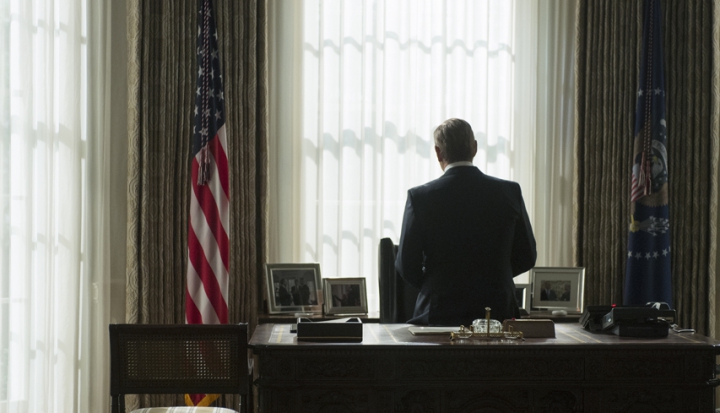In his 1988 Harper’s magazine essay, “The Reason for Stories,” novelist Robert Stone argued that fiction does for the collective unconscious of a culture what dreams do for our individual psyches. “The brain can’t function without clearing its circuits during sleep,” Stone wrote, “nor can we contemplate and analyze our situation without living some of the time in the world of the imagination, sorting and refining the random promiscuity of events.”
So what does it say about our own promiscuous times that, during the past TV season, there were five shows running concurrently that featured the President of the United States (aka POTUS) as a central fictional character? In case you missed one in the shuffle, TV presidents have been on Veep (HBO), Scandal (ABC), Madam Secretary (CBS), House of Cards (Netflix), and State of Affairs (NBC). State of Affairs has been cancelled, but the other four will be back for the campaign circus of 2016.
The last time there was anything like this was during George W. Bush’s second term, when our collective dream life was simultaneously ruled by Josiah Bartlet (Martin Sheen) of The West Wing, David Palmer (Dennis Haysbert) of 24, and Mackenzie Allen (Geena Davis) on Commander in Chief. Anticipating Hillary Clinton’s 2008 campaign flame-out, Commander in Chief was canceled after one season. Bartlet and Palmer, however, projected presidential personae that signified in important ways.
Running from 1999 to 2006, The West Wing came to represent a sort of liberal Democrat wish fulfillment. Bartlet was equal parts Bill Clinton without the impulse-control problems and Jimmy Carter with broader experience and a better staff. As America’s real-life invasion of Iraq turned disastrous, our dream leader, Bartlet, often got tough with the terrorists, but always brought our boys home by the end of the episode.
Palmer, also a Democrat, and an African American at that, could be read as providing bipartisan cover for the Cheney-esque torture tactics on 24. But the show’s depiction of his calm, decisive leadership could also be seen as providing a prototype for our first real-life black president. You know, the one who ordered the successful hit on Bin Laden.
This year’s fictional presidents range from buffoon (Veep) or puppet (Scandal) to murderous sociopath (House of Cards). If there is a theme here, it is that these presidents, far from riding on the back of history, are instead driven by forces beyond their control.
This is most obviously true of Scandal’s Republican President Fitzgerald Grant, who turns both his career and his heart over to his PR guru and secret love interest Olivia Pope. As the series has developed, viewers have learned that the real power is wielded by Pope’s father, who heads an out-of-control covert action unit called B613.
Frank Underwood, on House of Cards, is his own B613. The former South Carolina congressman is everything conspiracy theorists imagined Bill Clinton to be and more. His rivals who only lose their careers are the lucky ones. Kevin Spacey plays Underwood as a mash-up of Clinton, LBJ, and Hannibal Lecter, while delivering asides and soliloquies in the manner of Shakespeare’s Iago.
Underwood may seem to be the master of his universe, but he really is a clinical sociopath, driven by a blind need for domination. Meanwhile the affairs of state—war, peace, social policy, etc.—are nothing but place markers in his political game of bondage and submission.
The heroine of Veep is, like Geena Davis before her, an accidental president. She moved up at the end of the show’s third season when her president resigned after his First Lady attempted suicide.
Julia Louis-Dreyfus, best known as Elaine on Seinfeld, portrays Selina Meyer as a shallow, foul-mouthed manipulator surrounded by a staff of ambitious bumblers. She may occasionally experience an attack of Jeb Bartlet idealism, such as when she promises to make universal child care central to her presidential election campaign, but it quickly passes when the political costs get too high.
Meyer’s fate is driven by contingency and circumstance. For her and her staff, the only purpose of seeking power is to have power, and it is gained not by skill, character, or intelligence, but simply by dumb luck. It is cold comfort indeed to know that Washington insiders find Veep the most realistic of the current political entertainments.
The way Hollywood presents its fictional presidents may also say something about the hyper-partisanship of our day. For three of the five TV presidents, the political party affiliation is never revealed, a pretty big omission for political stories, and one clearly driven by fear of alienating anyone on our closely divided political landscape.
Of the two whose party is known, one, Fitzgerald Grant, is a moderate Republican. The other, Frank Underwood, is a Southern Democrat. Coincidentally, these are two species that in Washington today are as common as Whigs or Know-Nothings.
The bottom line from Hollywood seems to be that, at least at the presidential level, our politics can be played as tragedy, farce, or gladiator blood sport. It really doesn’t matter as long as you don’t muck around in the actual affairs of the polis.
All that boring stuff about who gets what, when, and how—all the blah, blah, blah about taxes, climate change, global trade, or terrorism, the stuff that affects real people—is all way too political for a political drama.
This column appeared in the August 2015 issue of U.S. Catholic (Vol. 80, No. 8, pages 40–41).
Image: Courtesy of Netflix













Add comment